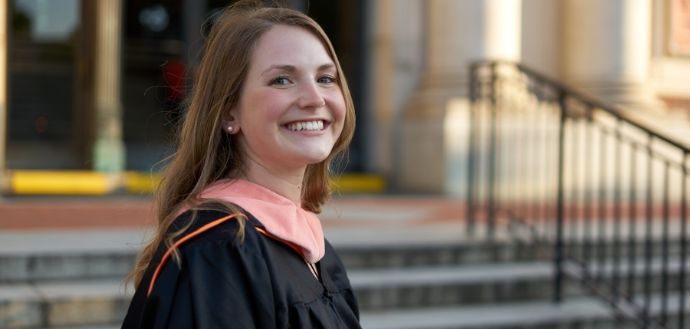
Public health is everywhere, says Joanna Kubes, BS ’18, MPH ’19, a Dayton, Ore., native and product development coordinator at Samaritan Health Plans who is making plans to attend medical school.
“I have never wanted to stay in one place my whole life, and public health will give me the flexibility to change up careers while still staying in the same field and also give me the opportunity to travel all over the world.”
Learn about Joanna’s journey to medical school, her experiences at Oregon State and why she thinks a career in public health is the perfect choice for lifelong learners who crave flexibility and enjoy helping others.
Why did you decided to pursue an MPH at Oregon State? What were your motivations?
“I grew up in a large family, and being the youngest and only girl, I had an instinct to be nurturing and would try to help ‘heal’ and comfort my older brothers and parents if they were ever injured. I was also that child who enjoyed the human body and what it can do, so I would read human anatomy books for fun.
“When I originally came to OSU, I followed my small-town roots and was majoring in agricultural business management. It was only until I took my first public health course that my passion for health and humans was reignited and I added on a public health major. Shortly afterwards, I learned that OSU had a new MPH program and I knew that I wanted to follow the accelerated track to continue my education.”
What did you most enjoy about the public health program?
“I enjoyed the faculty and their passion to help students launch into a career. I was surprised that master’s courses were more discussion based than test based, which took off some of the pressure and helped me focus on developing more practical skills.
“One thing that has stuck with me and that I use is the analytic skills from a health care law class. Health care law is so important and shapes how our economy can look, so I found it beneficial that I can now look at current health care news and laws and predict and analyze how they may affect our government for years to come.”
Do you think the program has prepared you or made you stronger professionally?
“Absolutely. My MPH helped shape and strengthen my soft skills. A lot of my classes required presentation, research and writing, and working in groups.
“I use that daily in my career and I know that I am more confident in all of those skill sets because of the practice I got from my classes.
How do you think the program will prepare you for medical school? Do you think it will make you a stronger student? How so? Why is a career in medicine for you?
“This program has helped prepare me for medical school immensely. It is important for providers to know and understand everything that occurs inside the human body, but it is more important for them to examine the issues that occurring outside of the body and relate it to the symptoms being shown.
“As a physician, you must meet your patients where they are, and if you are not willing to understand and look at an individual’s social determinants of health and life course, your treatment or care instructions for the patients will be virtually ineffective.
“I think having a rich and deep understanding of public health and all it entails is much more applicable than knowing chemistry or biology when it comes to helping patients. I want to become a physician so I can help people understand that everything that humans do and interact with daily can affect their health and shape how their life will look in years or decades to come and how they can become more proactive so they can live a long, happy and fulfilling life.”
Did you complete an internship during your program?
“I completed my internship with Samaritan Health Services working with the Case Management team. We helped deliver care and services to homeless populations and populations that were at risk. We also developed curriculum for providers that would help increase their understanding of local homeless issues and decrease provider compassion fatigue.
What are you up to currently?
“In my current position at Samaritan, I help develop health insurance plans and work closely with the state government to voice industry concerns about potential bills being introduced during legislative sessions to ensure that the organization is operating in accordance with state and federal laws.”

Why should prospective students consider a degree in public health?
“A public health degree can be used for anything. If you think about it, public health is the environment, the government, and marketing and advertising, such as Got Milk? campaigns, communicable disease information dissemination. Public health is research, and of course public health is providing actual medical care to individuals and communities, domestically and internationally.
“If you know you are someone who likes to constantly learn and develop new skills, then public health is for you. Tentatively, I will be transitioning from working in health insurance to providing medical care to patients, and even potentially developing health laws and policies within a system, state or federal level in the future. I think that shows just how flexible and exciting the world of public health can be!”